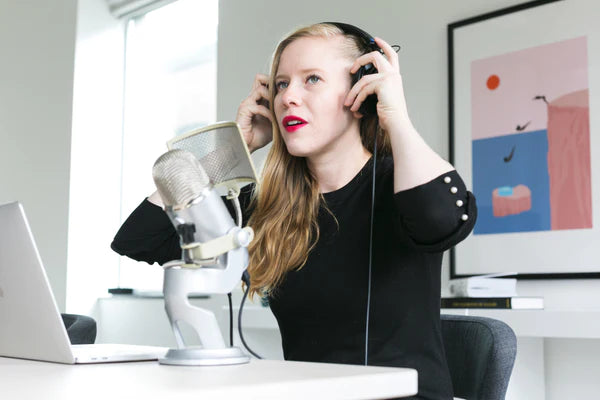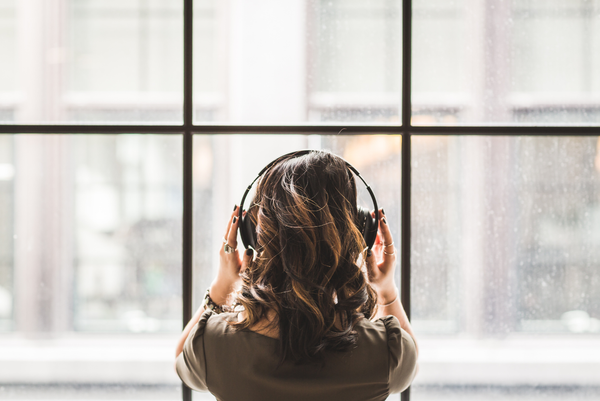
At its core, podcasting is about storytelling. And like any other form of storytelling, the way you tell your story matters. Audio quality plays a significant role in how your story is perceived by your listeners. Poor audio quality can be distracting and can make it difficult for your audience to engage with your content. On the other hand, high-quality audio can draw your listeners in and create a more immersive listening experience.
Creating an Acoustically Sound Recording Environment:
Creating an acoustically sound recording environment is essential for podcasters who want to achieve high-quality audio. Here are some tips for creating a recording environment that's free from background noise and echo:
Choose a quiet space
When selecting a location for your recording, choose a quiet space that's free from background noise. This could be a spare bedroom or a closet. It may seem basic, but your space should have a door. If in the basement and near your AC unit or furnace, make sure to turn it automatic mode during recording so it doesn't kick in during your show.

Consider flooring
The type of flooring in your recording environment can affect the acoustics of the space. Carpet can help to absorb sound, reducing echo and background noise. If you don't have access to carpet, consider using area rugs or blankets to cover hard flooring surfaces.

Address wall surfaces
The surfaces of your walls can also affect the acoustics of your recording environment. Hard surfaces like concrete or brick can reflect sound, leading to echo and background noise. Soft surfaces like curtains or tapestries can help to absorb sound and reduce echo.

Pay attention to corners
Corners in your recording environment can be particularly problematic when it comes to echo and background noise. If your desk is placed in the corner, highly consider using PET acoustic panels to reduce echo in the corners of your recording space. Curved PET acoustic panels are especially effective like the ones we feature on our MojoDome.

Use a quality cardiod microphone:
A quality microphone is essential for capturing high-quality audio. Look for a microphone that's designed to minimize background noise and pick up your voice clearly. A cardiod microphone is a type of directional microphone that picks up sound primarily from the front of the microphone while rejecting sound from the sides and rear. This makes it a great choice for podcasters who want to capture high-quality audio with minimal background noise.

Additionally, cardiod microphones are often designed to have a frequency response that's tailored to the human voice, making them a great choice for podcasters who want to capture the nuances of speech. They can also help to minimize pops and sibilance, which can be distracting to listeners. A quality and popular choice for less than $100 is the Blue Yeti.

Use a Standing Desk
Standing desks allow you to stay active and engaged during your podcasting sessions, helping you to maintain a more energetic and enthusiastic delivery. Standing while recording your podcast can also have a positive impact on your storytelling skills. Standing encourages better posture, which can help you project your voice more effectively and convey emotions and expressions more naturally.
Your voice is a crucial tool in podcasting, and standing while recording can help you optimize your vocal performance. When you stand, your diaphragm has more space to expand and contract, which can result in better breath control and voice projection. This can help you achieve a clearer and more resonant voice, making your podcast episodes sound more professional and engaging.
Another advantage of using a standing desk like MojoDesk for podcasting is its versatility. Many standing desks are adjustable in height, allowing you to easily switch between sitting and standing positions as needed. This flexibility can help you customize your recording setup to suit your preferences and comfort levels, allowing you to experiment with different positions and find what works best for you.

Conclusion:
Audio quality is critical for podcasters, and creating an acoustically sound recording environment is essential for achieving high-quality audio. By choosing a quiet space, paying attention to flooring, wall surfaces, and corners, using a quality microphone, and incorporating PET acoustic panels, you can create a recording environment that's free from background noise and echo, resulting in clearer, more professional-sounding audio for your podcast. In addition, using a standing desk can enhance vocal performance along with additional health benefits. So, invest in PET acoustic panels, a quality microphone, and follow these tips to take your podcasting to the next level.
Oh, and make sure to self-edit! Everything you say isn't gold; most is bronze.



